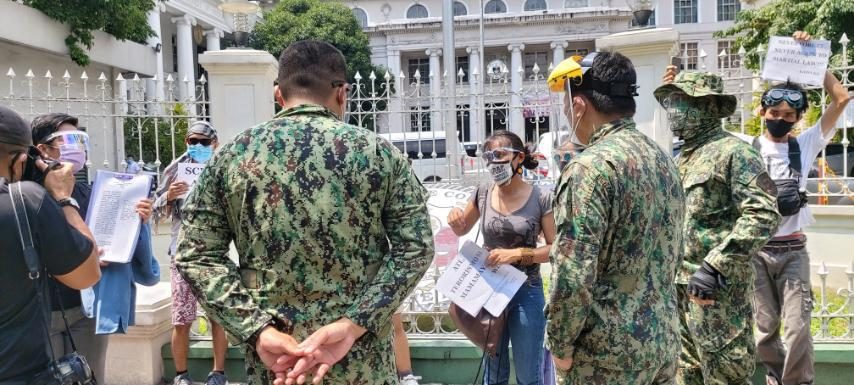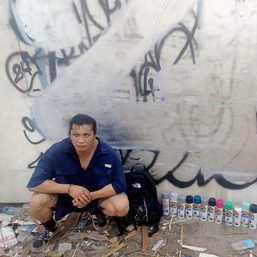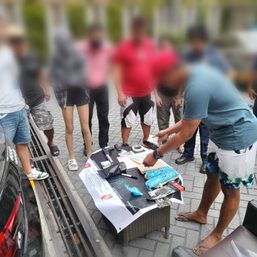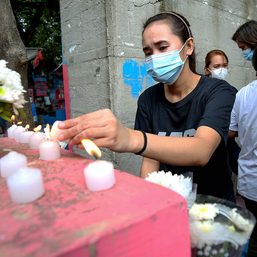SUMMARY
This is AI generated summarization, which may have errors. For context, always refer to the full article.

One group of Supreme Court petitioners against the anti-terror law found themselves in a slight scuffle with cops who were still reeling from the embarrassment of allowing a large gathering in Manila Bay.
While filings of anti-terror law petitions for the past 3 months have been quiet and uneventful, even with rallies and pickets here and there, personnel of Ermita Police turned strict on Monday, September 21, and dispersed a group of 7 petitioners.
The womens’ group led by lawyer Virginia Suarez was already the 2nd group to file their petition that day. Earlier, a group led by the Philippine Misereor Partnership Inc (PMPI) filed their petition and also conducted a brief program.
But when it was Suarez’s turn, the cops were there to enforce rules.
The acting chief of the Ermita Police himself, Lieutenant Colonel Alex Daniel, oversaw the dispersal. Daniel cited several violations including the common non-observation of physical distancing, non-wearing of face shields, and a supposed blanket ban on rallies.
“Bigla po silang nag-rally na kung saan nagkaroon po ng violation ng protocol sa social distancing, so umakto lang po ang pulis na paghiwa-hiwalayin sila, kaya napilitan silang paalisin,” Daniel told media.
(They suddenly held a rally where they committed a protocol violation of social distancing, so the cops stepped in to separate them, and were forced to disperse them.)
Suarez said they observed physical distancing but it was their placards that cops had a problem with.
“The police confiscated the tarpaulins and pinapaalis kami kaya nagkagulo (were telling us to leave that’s why there was a scuffle),” said Suarez.
Ban on rallies?
Daniel then cited a blanket ban on rallies, saying the passing around of tarpaulins and even chanting can transfer virus.
“Talagang pinagbabawal ang mga rally, kasi pag nag-rally tayo, dun na nagkakaroon ng grouping,” Daniel said.
(Rallies are really prohibited, because if you rally, then the grouping begins.)
Asked why the sudden strict enforcement on anti-terror law petitioners, Daniel shifted to the topic of the Manila Bay mishap from last weekend, where troves of people not observing physical distancing came to see the unveiling of the government’s beautification project.
“Mahigpit naman po kami kaso lang minsan, katulad ng nangyari sa Baywalk, nagkaroon lang po ng biglaan na hindi na naaksyunan sa dami ng tao, pero lahat po ng grouping dito sa Manila, inaaksyunan namin,” said Daniel.
(We’ve always been strict but sometimes, like what happened in Baywalk, we suddenly weren’t able to act on it because the crowd grew suddenly, but all groupings here in Manila, we are always able to address.)
Daniel replaced as Ermita station commander Lieutenant Colonel Ariel Caramoan, who was fired the day before for lapses in handling the large mass of people who went to see the artificial white sand of Manila Bay.
The project has been slammed by environmentalists and activists alike for using crushed dolomite, which has known hazards both to humans and the bay’s ecosystem.
Constitutional right
The Department of Environment and Natural Resources (DENR) stands by it, and opened it to the public on Saturday, September 19, attracting crowds who also did not observe physical distancing. Law enforcers were criticized for being lax on supporters of the government’s project, but strict on demonstrators.
The Philippine government insists that rallies are prohibited under quarantine because of the Inter-Agency Task Force or IATF rules against mass gatherings.
Lawyers continue to dispute the legality of this rule, citing constitutional rights to assembly and expression.
In the previous months, big rallies such as those held on Independence Day in June and President Rodrigo Duterte’s 4th State of the Nation Address (SONA) in July were able to push through peacefully because of agreements between progressive leaders and the Philippine National Police (PNP).
But there were still incidents of arrests of demonstrators – recently the Manila Pride protesters who were detained for days. They have countersued the Manila Police for violating their rights.
Anti-terror law
Suarez’s group was able to file their petition, and hold their picket after talking with the cops.
Suarez told media afterwards that: “Anti Terror Law is meant to silence critics. Silence breeds impunity. Impunity breeds violence. Thus, we will not be silenced.”
The anti-terror law is seen as a legal crackdown on dissent, with contentious provisions that would allow policemen and soldiers to arrest without warrant anyone whom they suspect of doing anything terroristic under vague and broad definitions.
Suarez’s group is the 37th to file a petition against the law.
The Supreme Court has yet to announce a schedule of oral arguments. – Rappler.com
Add a comment
How does this make you feel?









There are no comments yet. Add your comment to start the conversation.